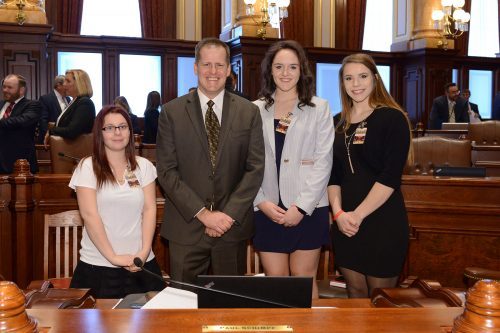Franklin County Farm Bureau News –
Gay Bowlin, Manager
Spring is here – now let the good weather begin and farming will be on the fast track. With that being said – you will begin seeing these signs around the county soon and if you would like to pick one up for yourself just stop in at the office and we will get you one.
 Anhydrous is being put on now and farmers have been and will be when the rain stops – spreading and spraying fertilizer. Several area farmers are also taking care of the wheat that is still in the fields.
Anhydrous is being put on now and farmers have been and will be when the rain stops – spreading and spraying fertilizer. Several area farmers are also taking care of the wheat that is still in the fields.
I know that the sign says “Start Seeing Farmers” but what it really means is “Drive Safely” – remember that we have to share the roadways with big equipment and we want everyone to be safe.
Things have changed a lot over the past 20 years for farmers. Technology on tractors that was once a shot in the dark is now a much appreciated reality. From auto-steer to field mapping, these are making it easier for farmers to get the crops in and out of the fields.
Marketing Myths on PORK – BEEF – POULTRY
Antibiotic free: All pork, beef and poultry is your grocery store is antibiotic free.
Gluten free: There is no gluten (a grain product) in pork, beef or poultry
GMO-free: There is no GMO in pork, beef or poultry
Hormone-Free: Added hormones are not allowed in raising pork and poultry – however, all animals have hormones but the USDA allows the label “raised without hormones” to indicate that no extra hormones were given to the animal
For those of you who ordered smoked pork loin from out Young Leaders they would like to say a big thank you. They sold over 50 loins and have close to $1,300 for their scholarships. If you have not already applied for the Farm Bureau and the Young Leaders Scholarships either call the office at 435-3616 or stop by – applications are due on April 5th.
The TV Show “Small Town Big Deal” which airs in our area on KBSI and WDKA – FOX on Saturday 7 am and Sunday at 6 am. “Small Town Big Deal “ has added a new section to their website. If you go to www.smalltownbigdeal.com the last tab to the right is “Small Town Big Heart”.
Rodney Miller and Jann Carl are using this as a platform to help fundraise for people across the nation who have extra special needs. The first fundraising commercial was filmed right here in Franklin County to help to benefit Makanda Williams from Ewing who was diagnosed with a rare form of brain cancer known as DIPG. Some of you might know her facebook page “MakandaStrong”.
The commercials will air during the weekly shows and on their website and hopefully will help in raising funds for the people who are highlighted. We hope that this brings even more awareness to DIPG and helps to raise money for Makanda’s treatments.
The primary election is over and now the real works for those who have been put on the ballot for the general election in November. If you think that there have been a ton of ads on TV and radio thus far – just wait. Now the real work begins for these people so expect even more mailing and even phone calls for the next 7 months.
Remember we are farmers working together. If we can help let us know.








